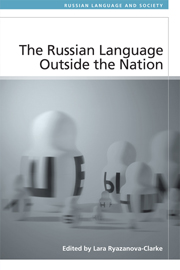Book contents
- Frontmatter
- Contents
- Notes on Contributors
- Cyrillic Transliteration System Adopted in the Book
- Introduction: The Russian Language, Challenged by Globalisation
- PART I Russian and Its Legal Status
- PART II Linguistic Perceptions and Symbolic Values
- 3 The Russian Language in Belarus: Language Use, Speaker Identities and Metalinguistic Discourse
- 4 What is Russian in Ukraine? Popular Beliefs Regarding the Social Roles of the Language
- PART III Russian-Speaking Communities and Identity Negotiations
- PART IV Language Contact and the Globalisation of Russian
- PART V Globalisation of Russian as Soft Power
- Index
4 - What is Russian in Ukraine? Popular Beliefs Regarding the Social Roles of the Language
from PART II - Linguistic Perceptions and Symbolic Values
Published online by Cambridge University Press: 05 September 2014
- Frontmatter
- Contents
- Notes on Contributors
- Cyrillic Transliteration System Adopted in the Book
- Introduction: The Russian Language, Challenged by Globalisation
- PART I Russian and Its Legal Status
- PART II Linguistic Perceptions and Symbolic Values
- 3 The Russian Language in Belarus: Language Use, Speaker Identities and Metalinguistic Discourse
- 4 What is Russian in Ukraine? Popular Beliefs Regarding the Social Roles of the Language
- PART III Russian-Speaking Communities and Identity Negotiations
- PART IV Language Contact and the Globalisation of Russian
- PART V Globalisation of Russian as Soft Power
- Index
Summary
Despite some decrease in its use in the wake of the breakup of the USSR and the promotion of Ukrainian as the only state language of independent Ukraine, Russian continues to be widely used in most practices of Ukrainian society. Its presence in those practices stems from different and often coexisting roles which, however, are rarely explicitly articulated in everyday or institutional discourses. Moreover, the legitimisation of its use in one role can pave the way for the use in another. First and foremost, Russian is the native language for a large part of the Ukrainian population, and for an even larger part, it is the main language of everyday communication. It is these two roles that primarily serve to justify the presence of the language in many social domains, including the media and popular culture, and to open the possibility for its use beyond the scope these roles require. This makes Russian part of the language repertoire of virtually all Ukrainians thus, in turn, helping to maintain its role as a language of everyday communication in society and, moreover, one not (quite) foreign in a cultural or even political sense. At the same time, Russian is also used and perceived in Ukraine as the main language of a neighbouring country, the primary language of international communication in the post-Soviet area and a window on the rest of the world whose other languages most Ukrainians still do not master.
- Type
- Chapter
- Information
- The Russian Language Outside the Nation , pp. 117 - 140Publisher: Edinburgh University PressPrint publication year: 2014

